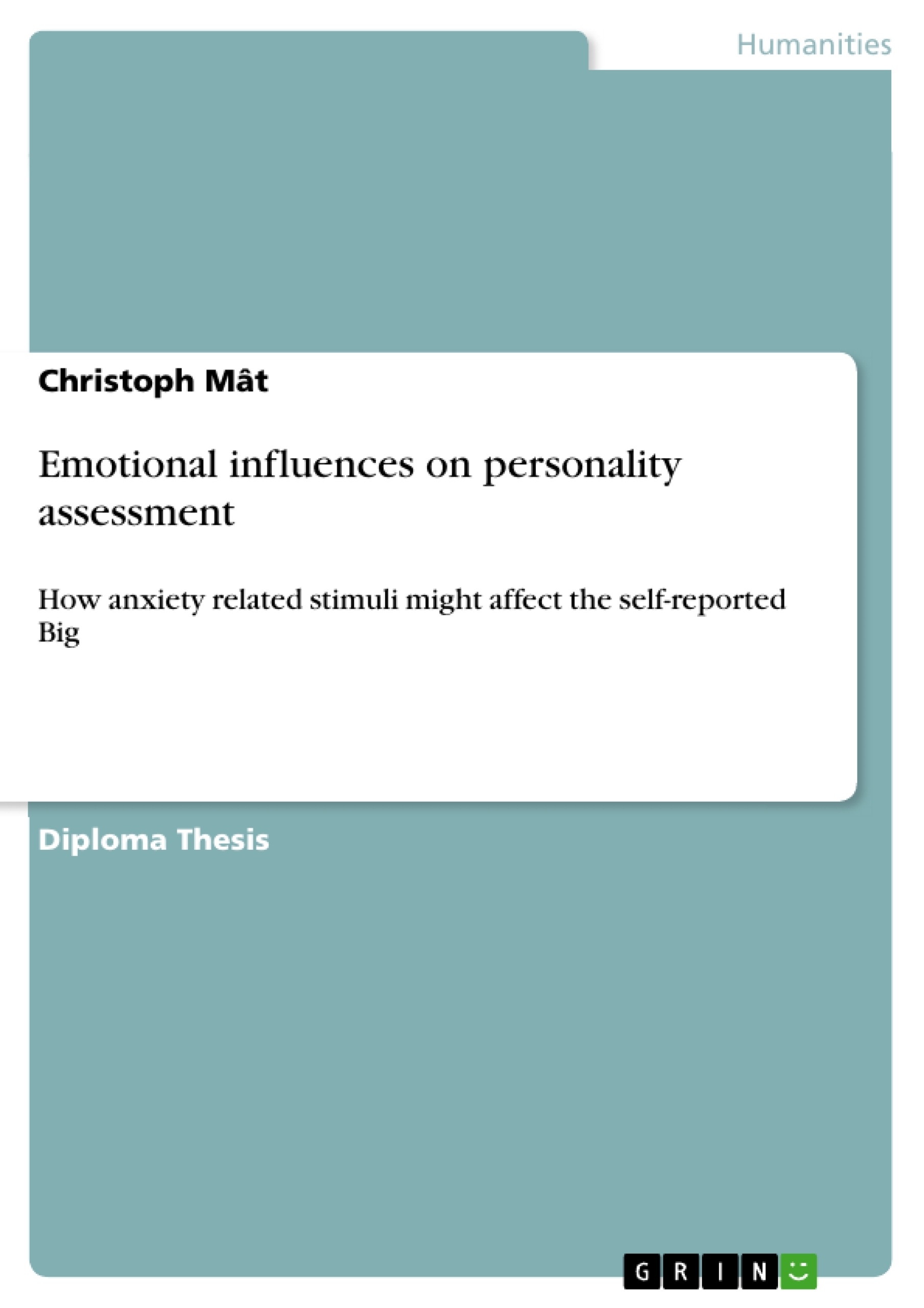To examine state influences on personality assessments 112 female subjects received anxiety priming in a pre-post-design under lab conditions. The Big Five were assessed with the NEO FFI. The treatment had a uniform effect on four of the Big Five scales. Neuroticism scores increased due to the treatment, which was hypothesized. Extraversion, agreeableness and conscientiousness mean scores decreased significantly in the post-measurement. Furthermore an augmentation in reliability in the post measurement of the Big Five scales was expected and observed but only found to be significant for the conscientiousness scale. Underlying processes leading to the uniform shift in mean scores as well as implications for diagnostic practice and future research are discussed.
Inhaltsverzeichnis (Table of Contents)
- Abstract
- Introduction
- Assessment of Personality
- State Influences on Personality
- Anxiety Priming Procedure
- Hypotheses
- Methods
- Participants
- Materials
- Procedure
- Data Analysis
- Results
- Discussion
- References
Zielsetzung und Themenschwerpunkte (Objectives and Key Themes)
This study aims to investigate the influence of state anxiety on self-reported personality traits, specifically the Big Five, using a pre-post design in a controlled laboratory setting. The study utilizes a manipulation of mood to explore how temporary emotional states impact personality assessments.- Examining the impact of state anxiety on personality assessments
- Exploring the influence of temporary emotional states on self-reported personality traits
- Investigating the effects of anxiety priming on the Big Five personality dimensions
- Assessing the potential for state influences to bias personality measurements
- Analyzing the implications for diagnostic practice and future research on personality assessment
Zusammenfassung der Kapitel (Chapter Summaries)
- Abstract: Introduces the study's focus on state influences on personality assessments, utilizing anxiety priming in a pre-post design with female participants. Briefly describes the findings, including the effects of the treatment on the Big Five scales and the observed reliability augmentation.
- Introduction: Emphasizes the importance of accurate personality measurements in various fields like clinical, forensic, and business psychology. Highlights the Big Five as fundamental personality dimensions and the use of self-report inventories like the NEO-FFI. Discusses the concept of state bias in personality assessments and the need to explore situational factors influencing these assessments.
- Assessment of Personality: Reviews the trait-based models of personality, focusing on the five factor model encompassing Neuroticism, Extraversion, Openness to Experience, Agreeableness, and Conscientiousness. Explains the use of self-report inventories like the NEO-FFI and the paradigm of classical test theory in personality assessment.
- State Influences on Personality: Discusses the impact of situational influences on personality assessments, particularly state anxiety, and its potential to introduce bias into the measurement process. Explores the importance of understanding and addressing these state influences to enhance the accuracy of personality assessments.
Schlüsselwörter (Keywords)
The primary focus of this study is on the influence of state anxiety on personality assessments, specifically the Big Five personality traits. It explores the role of situational influences, the impact of mood manipulation, and the potential bias introduced by state anxiety. The study utilizes the NEO-FFI, a self-report inventory, and the classical test theory framework for analyzing personality assessments. Key themes include state influences, personality measurement, anxiety priming, the Big Five, diagnostic practice, and the implications for future research in personality assessment.Frequently Asked Questions
How does state anxiety influence personality assessment?
The study found that anxiety priming significantly increased Neuroticism scores and decreased scores for Extraversion, Agreeableness, and Conscientiousness in the NEO FFI assessment.
What is the "Big Five" model in personality psychology?
The Big Five model includes five fundamental personality dimensions: Neuroticism, Extraversion, Openness to Experience, Agreeableness, and Conscientiousness.
What is the NEO-FFI?
The NEO-FFI is a widely used self-report inventory designed to measure the five major dimensions of personality.
Can emotional states bias personality test results?
Yes, the research suggests that temporary emotional states like anxiety can introduce bias, leading to uniform shifts in mean scores across several personality scales.
What are the implications for diagnostic practice?
Clinicians and psychologists should be aware that a patient's current emotional state can impact their self-reported personality traits, potentially affecting the accuracy of the diagnosis.
- Quote paper
- Christoph Mât (Author), 2009, Emotional influences on personality assessment, Munich, GRIN Verlag, https://www.grin.com/document/178731



